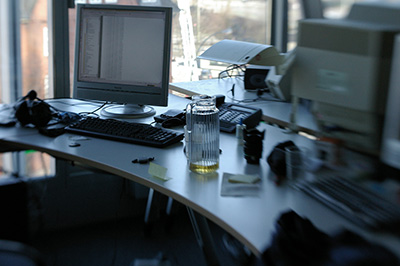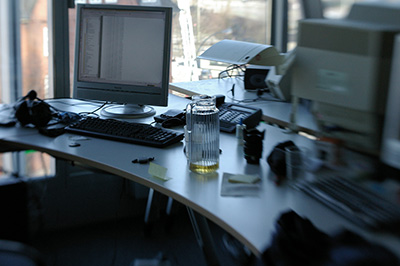
 (Photo: Jan Krutisch / Flickr)If the conventional way we do business reflects the best our human imagination can create, then what a sad commentary on imagination. In a November 12 Truthout article, “Work Should Adapt to Mothers: Human Shapes Don’t Fit Inhuman Holes,” I argued that conventional business needs to change and that democratic workplaces are better environments for working mothers.
(Photo: Jan Krutisch / Flickr)If the conventional way we do business reflects the best our human imagination can create, then what a sad commentary on imagination. In a November 12 Truthout article, “Work Should Adapt to Mothers: Human Shapes Don’t Fit Inhuman Holes,” I argued that conventional business needs to change and that democratic workplaces are better environments for working mothers.
The comments and reactions from readers were terrific – not in that everyone loved it, as many did not, but in that it seemed to strike a chord.
“A lot of this debate also ignores the assumption that MEN aren’t harmed and children aren’t DAMAGED by having husbands/fathers/partners enslaved into inhuman work habits,” wrote my friend Michael Rhodes, director of education at Advance Memphis, in an email to me. “The workaholic machine doesn’t work for families, even if it only crushes one partner.”
I definitely agree. My partner and I have had many discussions about the different expectations we face as new parents. Some people assume that he’s not as family-oriented as I and is happier to be at work than at home. This couldn’t be less true.
“The problem is not just what society expects, but what most of us men have been nurtured to expect and to provide,” writes Rhodes. “One reason we want to keep Rebecca [my wife] in the workplace, at least part time, is just so our sons grow up knowing that their mother, a woman, is every bit as intelligent and valuable to society as their father. How that works out? We’ll have to figure that out as we go along.”
We need to change the way we do business so that it supports women and men, parents and nonparents – in a word, people. This is why the movement toward democratic workplaces is so exciting. These are businesses in which people and communities are valued as much as companies because in a democratic, worker-controlled business, the people are the company. We should recognize that for the business to be successful, people in our communities and in the larger world need to be successful so that they can patronize our businesses’ goods and services.
In my company, for example, we are for-profit – I’m not out in the world selling games and educational resources just to keep my moral compass satisfied. I do it to earn a living. More than any other place I’ve worked though, I will do whatever it takes to make our business thrive, because I know I matter there as a person, not just as a worker.
This brings me back to my point about imagination: Some people argue that the idea of changing work to suit human lives is absurd and would lead to more regulations that would stifle business, particularly small businesses. Better instead to stick with what we have than to imagine any alternative. However, we shouldn’t confuse regulations that empower families and provide space for responsible parenting with government regulations that impede businesses. All too often, the nuances of this argument are brushed aside by those claiming to be pro-business. While we don’t want to stifle companies and the economy, we shouldn’t accept businesses that stifle lives for the sake of profitability.
The bottom line is that when we separate the company and its workers and prioritize the former over the latter, we hurt the economy, which is exactly what we’re seeing now.
For most of us, I’m not sure what about our current economic structure is worth defending. When the bottom 90 percent of our population work 40, 50, 60 hours a week to make in a year what the top 1 percent earn in a week or an hour, is that a healthy system? When the success of a business is predicated on a handful earning the biggest paychecks while the majority of people, working equally hard, make only a small fraction of those paychecks, is that a system worth replicating?
Much of what I’m talking about here would take a monumental cultural shift from a society that prizes the wealthy and helps them maintain their wealth at great cost to everyone else, to a society that values people over business and money. The democratic workplace model provides a natural bridge from a capitalist economy to a democratic economy that is focused on people and the planet, in addition to providing a living for its members.
I believe there is a path forward wherein traditional businesses, even without transitioning to a cooperative structure, can learn from democratic workplaces and adopt the way they function. In my company’s blog, I wrote about a recent article by David Brodwin in US News and World Report that made the case for why more employee-owned businesses are needed in the United States. The writer compared cooperatives and top-tier professional firms run by partnerships, stating that each type of business is more accountable, resilient, and flexible. This is what our local and national economies need.
The good news is that these businesses are on the rise. “The number of worker-owned business in the United States is growing robustly, around 6 percent per year, and these businesses now account for about 12 percent of the private sector workforce,” writes Brodwin. But we still have a long way to go because so few people know there is an alternative.
Democratic businesses allow workers to prioritize how they interact with work and with their families and to create an economy that doesn’t put the two at odds. Though the number of these businesses is growing, it will still take a considerable amount of effort to create a more equitable, democratic economy. This is a lot to ask of people who are working hard just to pay their bills, as well as those who have children and, thus, depleted time and energy.
Yet this makes my point: If we don’t even have the time to think about balancing work and life so we’re less strained and stressed, then clearly conventional business and a capitalistic economy isn’t working.
Join us in defending the truth before it’s too late
The future of independent journalism is uncertain, and the consequences of losing it are too grave to ignore. To ensure Truthout remains safe, strong, and free, we need to raise $24,000 by the end of today. Every dollar raised goes directly toward the costs of producing news you can trust.
Please give what you can — because by supporting us with a tax-deductible donation, you’re not just preserving a source of news, you’re helping to safeguard what’s left of our democracy.